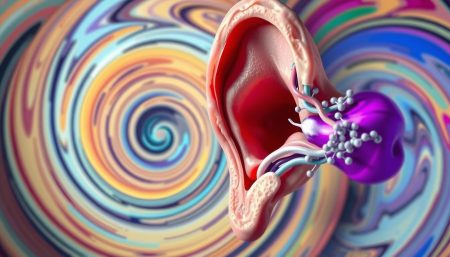Ever felt like the world is spinning when you’re under pressure? You’re not alone. Stress-induced vertigo is a real phenomenon that affects many people. This dizzying experience can make you feel off-balance and disoriented, often catching you off guard.
Stress dizziness isn’t just in your head. It’s a physical response to mental strain. When anxiety kicks in, your body reacts in ways that can throw off your equilibrium. This connection between stress and vertigo is more common than you might think.
Understanding anxiety vertigo is crucial for those who experience it. It’s not just about feeling dizzy; it’s about how stress impacts your body’s balance systems. Let’s dive into the world of stress-related balance disorders and uncover the truth behind this puzzling condition.
The Relationship Between Stress and Vertigo
Stress and vertigo often go hand in hand, affecting our balance and well-being. It’s important to understand this connection to manage stress effectively.
Understanding the Vestibular System
The vestibular system in our inner ear is key for balance and spatial awareness. Stress can harm this system, causing dizziness and disorientation.
How Stress Affects Balance
Stress can mess with the vestibular system, leading to balance problems. Chronic stress may contribute to vertigo, making it hard to stay stable and aware of our surroundings.
The Neural Pathways of Stress Response
The body’s stress response can affect our balance mechanisms. This can trigger or worsen vertigo, creating a cycle of stress and dizziness.
| Stress Factor | Impact on Balance | Potential Symptoms |
|---|---|---|
| Chronic Anxiety | Vestibular System Dysfunction | Persistent Dizziness |
| Acute Stress | Temporary Balance Disruption | Short-term Vertigo |
| Prolonged Tension | Altered Spatial Perception | Disorientation |
It’s crucial to understand how stress and vertigo are connected. By tackling stress balance problems, we can reduce vertigo episodes and improve our lives.
Can Stress Cause Vertigo: Medical Evidence and Research
Research shows a strong link between stress and vertigo. Studies indicate that psychological stress can start or make vertigo worse. This is why many feel emotional vertigo when stressed.
A study in the Journal of Vestibular Research found that 60% of people with chronic vertigo said stress was a big trigger. This study shows how stress affects the vestibular system, which helps us balance and understand space.
Another study in the European Archives of Oto-Rhino-Laryngology found that people with stress-related disorders were 2.5 times more likely to get vertigo. This shows a clear link between stress levels and vertigo.
| Study | Participants | Key Finding |
|---|---|---|
| Journal of Vestibular Research | 200 | 60% reported stress as major vertigo trigger |
| European Archives of Oto-Rhino-Laryngology | 1000 | 2.5x higher vertigo risk in stress-related disorders |
These studies offer strong evidence that stress can lead to vertigo. Knowing this link is key for both patients and doctors to manage and prevent vertigo.
Common Symptoms of Stress-Induced Vertigo
Stress dizziness and anxiety vertigo show up in different ways. Knowing these symptoms helps us spot and tackle the problem quickly.
Physical Manifestations
Stress-induced vertigo often brings physical discomfort. People might feel like they’re spinning or lose their balance. They might also get nauseous, sweat a lot, or have a fast heartbeat.
Some experience blurry vision or hear ringing in their ears.
Psychological Symptoms
The mind also reacts to stress vertigo. Anxiety and fear of falling are common. People might feel confused or have trouble focusing.
Some feel disconnected from their surroundings or have panic attacks.
Duration and Intensity Patterns
Vertigo episodes vary in length and strength. They can last from seconds to hours. Some people have mild, frequent spells. Others face intense but rare occurrences.
Stress levels often influence how severe the symptoms are.
| Symptom Type | Common Manifestations | Typical Duration |
|---|---|---|
| Physical | Dizziness, nausea, sweating | Minutes to hours |
| Psychological | Anxiety, confusion, panic | Can persist after physical symptoms |
| Sensory | Blurred vision, tinnitus | Variable, often alongside physical symptoms |

Knowing these patterns helps manage stress-related vertigo better. It’s key to tackle both physical and psychological aspects for full relief.
Types of Stress That May Trigger Vertigo Episodes
Stress-induced vertigo comes from many parts of our lives. Knowing what triggers it is key to handling symptoms and avoiding future episodes. Let’s look at the different stress types that might cause emotional vertigo.
Acute stress happens from sudden, intense events. A job interview, public speaking, or unexpected conflicts can trigger vertigo. Our body’s fight-or-flight response can disrupt our balance.
Chronic stress, however, builds up over time. It comes from work pressure, financial worries, or relationship issues. This ongoing stress can slowly harm our balance system, raising the chance of vertigo.
Emotional trauma is another big trigger. Experiencing a loss, accident, or other distressing event can cause emotional vertigo. The psychological effects of trauma can show up physically, affecting our balance and sense of space.
| Stress Type | Examples | Potential Impact |
|---|---|---|
| Acute Stress | Job interviews, deadlines | Immediate vertigo episodes |
| Chronic Stress | Work pressure, financial issues | Gradual onset of vertigo |
| Emotional Trauma | Loss, accidents | Prolonged vertigo symptoms |
Knowing these stress types helps find personal triggers. By identifying specific stressors, people can create plans to manage stress-induced vertigo. This improves their overall health and well-being.
The Impact of Anxiety on Balance and Spatial Orientation
Anxiety can really mess with our balance and how we see space. It’s more common than people think to feel vertigo and balance issues because of stress.
Panic Attacks and Dizziness
When we have panic attacks, we often feel really dizzy. This dizziness can feel like true vertigo. Our brain’s fear response changes blood flow and muscle tension, making us feel like we’re spinning.
Chronic Anxiety Effects
Long-term anxiety can make balance problems stick around. People with chronic anxiety might feel off-balance even when they’re not stressed. This can start a cycle where fear of falling makes anxiety worse, and balance problems get even more severe.
Fight-or-Flight Response
The fight-or-flight response is a big player in anxiety-related balance issues. This survival mechanism changes how we see things and how our body feels, sometimes causing vertigo-like symptoms.
| Anxiety Symptom | Impact on Balance |
|---|---|
| Hyperventilation | Lightheadedness, dizziness |
| Muscle tension | Altered posture, unsteadiness |
| Heightened sensory awareness | Increased sensitivity to motion |
Understanding these connections can help those dealing with anxiety vertigo and stress balance problems. Recognizing the link between mental state and physical symptoms is often the first step toward finding relief.
Natural Remedies and Lifestyle Changes for Managing Stress Vertigo
Managing stress vertigo often means using natural remedies and making lifestyle changes. These methods can help lower stress and ease vertigo symptoms without medication. By adding these strategies to your daily life, you can feel better and handle stress vertigo more effectively.

Relaxation techniques are key in managing vertigo stress. Deep breathing, meditation, and progressive muscle relaxation calm your nervous system and lower stress. Doing these regularly can make vertigo episodes less frequent and less severe.
Physical activity is also crucial in treating stress vertigo. Exercise releases endorphins, which boost your mood. Try yoga, tai chi, or gentle walks to improve balance and reduce stress without causing vertigo.
| Natural Remedy | Benefits for Stress Vertigo |
|---|---|
| Herbal teas (e.g., chamomile, lavender) | Promotes relaxation and reduces anxiety |
| Essential oils (e.g., peppermint, ginger) | Eases nausea and dizziness associated with vertigo |
| Acupuncture | Balances body’s energy and may alleviate vertigo symptoms |
| Dietary changes (reducing caffeine and alcohol) | Minimizes triggers that can worsen vertigo |
Getting a consistent sleep schedule is essential for managing vertigo stress. Aim for 7-9 hours of quality sleep each night to help your body recover and maintain balance. A relaxing bedtime routine can also improve sleep quality and lower stress levels.
Medical Treatments and Professional Help Options
If stress vertigo symptoms don’t go away, getting help from a doctor is key. Medical experts have many treatments for stress vertigo. These aim to fix the stress and the vertigo symptoms.
Medications and Therapies
Doctors might give you medicine for stress vertigo. This could be anti-anxiety drugs, antidepressants, or things to stop the vertigo. They also suggest therapies like cognitive-behavioral therapy (CBT) and vestibular rehabilitation therapy (VRT).
When to Seek Medical Attention
See a doctor if you have vertigo that:
- Happens a lot or is very bad
- Gets in the way of your daily life
- Comes with other symptoms like hearing loss or headaches
Seeing a doctor early can stop things from getting worse. It can also make your life better.
Treatment Approaches
Dealing with stress vertigo often means trying different things. This might include:
- Exercises to improve balance
- Ways to handle stress better
- Changing what you eat
- Getting better sleep
Doctors work with you to make a plan that fits you. They want to make vertigo less and make you feel better overall.
Prevention Strategies for Stress-Related Vertigo
To stop stress-related vertigo, you need a few steps. Using the right stress vertigo prevention methods can help. Here are some top ways to manage vertigo stress.
Stress Management Techniques
It’s important to manage stress to avoid vertigo. Try deep breathing, meditation, and muscle relaxation. These calm your body and mind, helping to prevent vertigo.
Lifestyle Modifications
Making small changes in your life can help a lot. Get enough sleep, eat well, and cut down on caffeine and alcohol. A regular schedule also helps manage stress and prevent vertigo.
Exercise and Balance Training
Exercise is key for preventing vertigo. Add balance exercises to your routine to boost your balance. Yoga and tai chi are great for both stress relief and balance.
| Prevention Strategy | Benefits | Frequency |
|---|---|---|
| Meditation | Reduces stress, improves focus | Daily, 10-15 minutes |
| Balanced Diet | Stabilizes blood sugar, supports overall health | Every meal |
| Balance Exercises | Enhances vestibular function, prevents falls | 3-4 times per week |
Using these methods can greatly improve your vertigo stress management. Remember, being consistent is crucial in preventing stress-related vertigo and keeping well.
Understanding Long-Term Effects and Recovery
Living with stress-induced vertigo can be tough, but you can get better. Many ask, “Can stress cause vertigo?” Yes, it can, and it might lead to long-term balance issues and dizziness.
To manage stress balance problems, you need a plan. This includes reducing stress, making lifestyle changes, and sometimes getting medical help. Regular exercise, good sleep, and a healthy diet can help your symptoms improve.
Many people have beaten stress-related vertigo. With hard work and the right strategy, you can too. Remember, getting better takes time. Stay patient and keep trying, and you’ll overcome stress-induced vertigo’s long-term effects.
FAQ
Q: Can stress really cause vertigo?
A: Yes, stress can cause vertigo. This is known as stress-induced vertigo. It happens when stress makes you dizzy and disoriented. Stress hormones can mess with your balance, leading to vertigo.
Q: How does stress affect the vestibular system?
A: Stress hormones like cortisol and adrenaline can harm the inner ear and brain. This disrupts balance and can cause vertigo.
Q: What are the common symptoms of stress-induced vertigo?
A: Symptoms include dizziness, feeling like you’re spinning, and losing balance. You might also feel nauseous and disoriented. Some people get anxious or have trouble focusing.
Q: How long does stress-induced vertigo typically last?
A: Vertigo episodes can last from a few minutes to days. Chronic stress can make episodes more frequent or long-lasting.
Q: Can anxiety cause vertigo without other stress factors?
A: Yes, anxiety can cause vertigo on its own. This is due to the body’s fight-or-flight response affecting the vestibular system.
Q: What are some effective treatments for stress-induced vertigo?
A: Treatments include stress management, vestibular exercises, and cognitive-behavioral therapy. Sometimes, medication is needed.
Q: Are there any natural remedies for managing stress-related vertigo?
A: Yes, natural remedies include exercise, sleep, and a balanced diet. Herbal supplements and relaxation techniques like yoga can also help.
Q: When should I seek medical attention for stress-induced vertigo?
A: Seek medical help if vertigo is severe, lasts a long time, or affects your daily life. Also, if you have sudden, severe vertigo with other symptoms, get help right away.
Q: Can stress-induced vertigo be prevented?
A: While prevention is not always possible, there are ways to reduce stress vertigo. Manage stress, stay healthy, exercise regularly, and seek help for anxiety or stress disorders.
Q: Is stress-induced vertigo a chronic condition?
A: Stress-induced vertigo can become chronic if stress and anxiety are not managed. But, with the right treatment and lifestyle changes, symptoms can lessen over time.


















